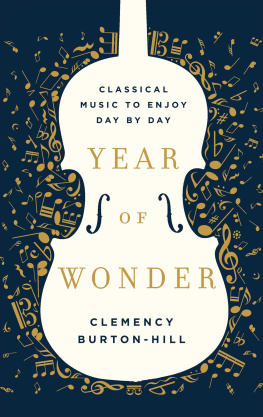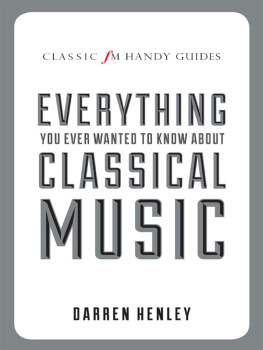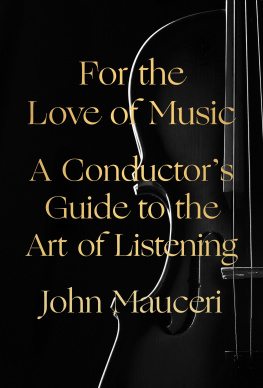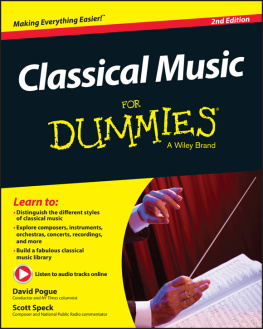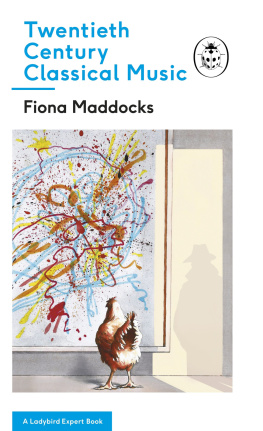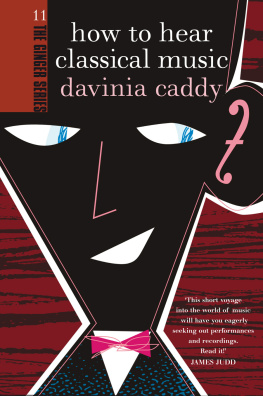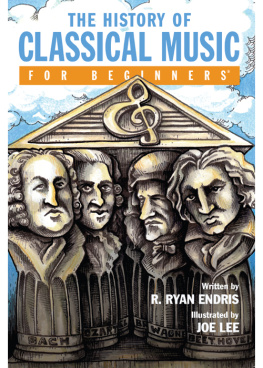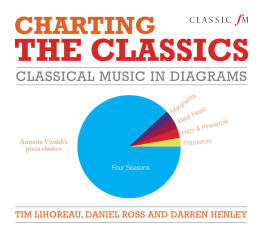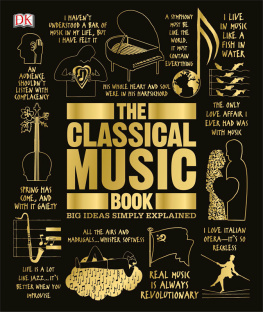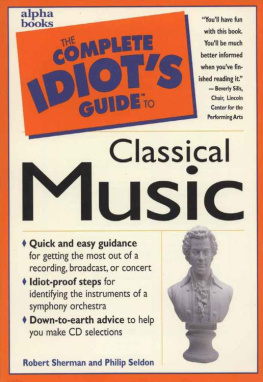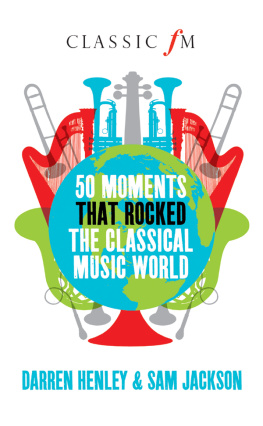W e are a music-making species always have been, always will be and musics capacity to explore, express and address what it is to be human remains one of our greatest communal gifts. We are also a music-exchanging species: people have used music to communicate and connect with one another since the beginning of time. Im lucky enough to have had classical music in my life since I was little, and now, as an adult, I have the good fortune of doing a job that involves sharing it with others. One of the many joys of presenting the BBC Radio 3 Breakfast show is hearing how the music we play enriches peoples daily lives. I cant tell you how cheering it is when a listener gets in touch to say something along the lines of, Wow, that piece has really set me up for my day. And it works both ways: I feel equally grateful when a listener recommends something wonderful that Ive never previously heard. (Gratitude thats often accompanied by mild outrage that Ive existed so many years without it; like meeting your best friend late in life.) This form of cultural exchange goes back millennia: as human beings we evolved by coming together around the fire every night, singing songs and telling stories invariably, telling stories through singing songs. Thats what our ancestors did; thats how they made sense of the world and each other; thats how they learned how to be.
It is an impulse that is still fundamental to who we are. Yet our own modern lives are frazzled and fragmented to an unprecedented degree; most of us probably feel a million miles away from that quotidian fireside jam session. Who, seriously, has the luxury of taking time out each day to listen to music? What about the piles of undone laundry, the inboxes of unanswered emails, the dishwashers of unloaded plates? Seriously? Perhaps, though, we have never needed it more, this space to think and reflect and connect and just be. This book is in part about exploring what happens when we open up our lives to let such music in. Scientific research is increasingly proving that regular acts of self-care (stay with me!) can have untold benefits on our mental health and spiritual well-being; and while personally Ive never been able to get the hang of, say, regular meditation or yoga, I hear others extol the virtues of these daily rituals and I realize they echo my belief about the way music can work on us. How it can act as a powerful mental tonic that can inexplicably but undeniably set you on the path to a better day or night. How a daily dose of such music can be a form of sonic soul maintenance.
Daily dose, though. Virtues, though... I am wary of the sense of obligation these words conjure. I dont believe we should listen to certain things just because someone has told us we should. We live in times whereby on the one hand, classical music is being ever more marginalized by mainstream culture, yet on the other, there exists this vague cultural awareness that we should listen to it because it will somehow make us more intelligent, more refined, more civilized. This is not helpful. Nor is the cause of classical music served by those who assume that it is superior to other types of music which is just plain wrong or those who, deep down, believe it must remain the preserve of people with certain backgrounds, educations or skin colours which is opportunity-hoarding at its most lazy and repellent. Amid these conflicting messages, which are connected to even bigger questions around class, education policy and our ever-shifting media landscape, we have somehow lost sight of whats at the centre of it: the music itself. Music that is full of things that may dazzle or move or energize or calm you; music that may make you cry or think or laugh or gasp; music that may teach you things, make you question things, make you wonder. Music that is now available to ever more of us, in vast quantities and for the first time in history, at the click of a button but which may still remain off-limits to all but a handful of the ultra-initiated.
So, know this: what lies ahead is not some white girl with a posh name telling you that you should listen to classical music every day in order to somehow become a better, smarter or more classy person. I have no interest in making you feel ashamed because you have never heard of some of these composers or their music why on earth should you have done? Nor am I trying to stealthily replace your Real Housewives or Love Island habit, or whatever else you might be into, with this stuff. You do you: there is no reason why classical music cant happily coexist in a mixed cultural diet.
What I am determined to do, though, is to extend a hand to those who feel that the world of classical music is a party to which they havent been invited. I want to open up this vast treasury of musical riches by suggesting a single piece to listen to every day of the year: by giving it some context, telling some stories about the people behind it, and reminding you that it was created by a real person probably someone who shared many of the same concerns as you, who wished to express themselves and happened to do so through this particular sequence of musical notes. Its really important to remember that music does not exist in a vacuum: it requires listeners, audiences, witnesses in order to come alive; to be heard, to be felt. And thats you!
Classical composers are no different from other writers of music, or any creative artist: all they are doing, in their own way, is seeking to get down on paper something they think and feel which in turn makes others think and feel. Its an exercise in human connection and generosity that might seem complex on the page when you look at all those black notes, but comes down to something exquisitely simple. Nobody sets out to write music thats unintelligible or inaccessible; nobody writes music with the intention that it will never get off the page, or hopes that it will alienate all but the tiniest coterie of dedicated experts. Musics very raison dtre is to be brought to life, to be experienced in time, to be listened to. In other words, these composers want to talk to you. And whatever your immediate emotional response is to what they say, that is valid, irrespective of whether youve ever had a piano lesson or know your portamento from your obbligato (exactly). As intellectually stimulating as it is for some listeners and experts to dig deeper and learn more about a work or a composer or a style or a technique, there is no such thing as getting classical music wrong. Youre human? You have ears? Its yours. Its there for the taking. Welcome.
My objective is to empower you to know that this music, so often kept behind seemingly insuperable barriers by those who wish to protect it for the exclusive pleasure of a tiny minority, is yours to engage with and respond to on your own terms just as you would any other genre.
Music, which extends across cultures and boundaries, which requires no translation to be understood, is the most uniting language we have. I have witnessed this first hand, working with musicians in the Middle East, Africa, Asia, Latin America and Europe and have been repeatedly awed by the ability that music has to bring disparate, different people together. Just as people are people, made of the same essential stuff, all music is created with the same sonic DNA, the same tonal building blocks, those miraculous vibrations of air that can be shaped in myriad ways to become a Bach cantata here, a Beyonc chart-topper there.

